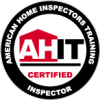WHAT IS RADON?
Radon is a colorless, odorless, radioactive gas produced from the decay of radioactive elements such as uranium. It is naturally found in rock and soil but can easily move into the air and groundwater. While radon levels in outdoor air are often negligible, it tends to collect in high concentrations indoors. The gas enters houses and buildings through pores and cracks in the concrete foundation or through floorboards of poorly ventilated crawl spaces.
HOW CAN RADON AFFECT MY HEALTH?
Although radon may be ingested through contaminated groundwater or well water, the primary risk of exposure comes from inhalation. Radon is a lung carcinogen. When airborne radon gas breaks down into tiny radioactive elements (radon progeny), it can lodge in the lining of the lungs and damage lung cells with radiation. According to the American Cancer Society, radon gas is the second leading cause of lung cancer. About 20,000 lung cancer deaths per year are related to radon.There are no immediate symptoms that will alert you to the presence of radon, as it typically takes years of exposure for any problems to surface.
HOW DO I KNOW IF THERE IS RADON IN MY HOME?
Since radon cannot be detected with the senses, it must be confirmed with specific instruments and laboratory tests. Radon testing is fairly inexpensive and easy. Many home improvement stores offer test kits or you can order one online. You can also hire a trained professional to do radon testing for you. Greg Kolar is licensed by the state of Ohio to perform radon gas testing services through Keystone Home Inspection.
WHAT CAN I DO TO PROTECT MY FAMILY FROM RADON?
If your home has been tested and determined to have high concentration levels of radon, there are some simple steps you can take to reduce exposure. You can seal up any cracks in your floors or walls. There are also simple systems that have been proven to effectively remove radon from crawl spaces or from beneath your concrete floor or basement slab with minimal changes to your home. If you own a private well, it is highly recommended to test your well water to ensure that radon levels meet the Environmental Protection Agency’s (EPA's) proposed standard. If necessary, Keystone’s licensed radon gas inspector can refer you to an Ohio-certified radon mitigator in and around Cleveland, Ohio.
Contact Us
* - Required Field
Keystone Home Inspection is proud to be a home inspector in the Greater Cleveland, Ohio area including Cuyahoga County, Geauga County, Lake County, Lorain County, Medina County, Portage County, and Summit County.
All Rights Reserved 2025, Keystone Home Inspection - Admin Login | Privacy Policy | Digital Marketing & Social Media Marketing by Alt Media Studios







